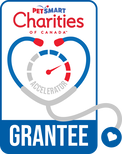Despite extremely rare condition, Toby is back to normal and expected to have many more year One family is relieved and thrilled after their 11-year-old cat experienced an incredibly rare health crisis – and is now home and happy!
Toby lives with Mandy Lichtmann, RAPS’ Volunteer and Outreach Coordinator, and Eyal Lichtmann, RAPS’ CEO, and their family. The trouble started in April, when the normally extroverted and cuddly Toby became withdrawn from the family. Soon, he was vomiting continuously and not eating. Dr. Assaf Goldberg at the RAPS Animal Hospital examined Toby and ordered blood work, X-rays and an ultrasound. “It showed a mass in his bowel so surgery was recommended,” Mandy says. Due to the location and the size of the mass, the surgery was very challenging. The mass caused severe damage to the intestinal segment involved, leading to a blockage of the gastrointestinal tract. Toby could not pass food and therefore he was vomiting and had decreased appetite says Dr. Goldberg. The mass was inside a 15-centimetre section if Toby’s gastrointestinal tract. That meant that section had to be removed and the tract on either side joined together during the surgery. Despite the complicated procedure, all went well. The doctor and the family awaited the biopsy results. Blockages like this are frequently cancerous at Toby’s age and everyone prepared for the worst. “I thought we were going to lose him,” Mandy says. Toby was hospitalized at the RAPS Animal Hospital for a few days with IV fluids, antibiotics and pain medication and supportive care. After a few days, he returned home with a feeding tube in his neck. “I had to tube-feed him up to five times a day,” she says. “He was a really good patient, thank goodness, because not all cats are when they are being tube-fed. The hospital was great whenever I had any concerns. After about a week, we took him off all pain meds and he was a total trooper. He really started to come back to life, his personality came back, he started to eat on his own and since then he's been great.” Then came the great news: The growth was not cancerous. It was a benign and extremely rare condition called gastrointestinal eosinophilic sclerosing fibroplasia. It could have been fatal but, since it was removed, Toby is expected to suffer no side-effects. “He's back to normal,” says Mandy. He'll be on a special digestive care diet probably for the rest of his life, but that’s a small price to pay for the Lichtmann family to have their old Toby back to normal. Dr. Goldberg says this condition is so rare that most veterinarians will never encounter it in their careers. Veterinary medicine has advanced dramatically in recent decades and conditions that might have led to an animal’s death are often ameliorated or cured with innovative care. “We love stories like this,” says Dr. Goldberg. “It is such a joy to tell a family that their pet is going to recover and that they will likely have many more years together.”
0 Comments
Changes in Human Behaviour Lead to Changes in Coyote Routines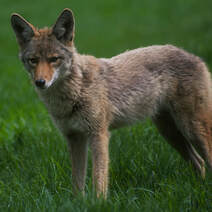 Springtime is breeding season for coyotes, as it is for many other animals. By and large, coyotes coexist mostly uneventfully with people and domestic animals. However, emerging evidence suggests that the coronavirus crisis is having consequences on coyote behaviours. The decrease in human activity may be driving coyotes into areas they would usually avoid, such as now-deserted town centres. Additionally, the decrease in restaurant, café and takeout meals is reducing the availability of discarded human food, which attracts coyotes and/or their rodent prey. As a result, several concerning incidents have occurred. A person on a local COVID-19-related social media platform said he and his dog were pursued two blocks by a coyote in the Oakridge area Sunday, until they got safely home. News reports say that a dog was killed and a cyclist was pursued by coyotes in the Fraser Valley in recent days. As a result, the B.C. Conservation Officer Service has issued a warning and advice for people to protect themselves and their pets. Preventative measures include:
If you experience a worrying encounter with a coyote (or a wolf), the service advises:
Call the Conservation Officer Service Call Centre at 1-877-952-7277 if a wolf or coyote poses an immediate threat or danger to public safety. If your pet has been injured or has come in contact with a wild animal, call the RAPS Animal Hospital, which is open during this crisis with special protocols in place, at 604-242-1666. Regional Animal Protection SocietyLatest Update – March 30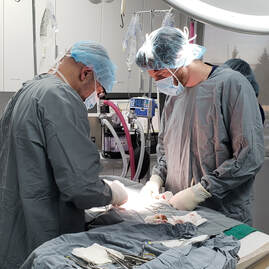 We hope that you and those you love – humans and other animals – are staying healthy at home and maintaining social distancing. We want you to know that RAPS is doing our best to continue services to the animals. Here is a summary of our actions and activities. At all RAPS facilities, best practices in proscribed sanitization and social distancing have been implemented. RAPS Animal Hospital The RAPS Animal Hospital is open as an essential service to care for animals. Staff are still working hard, with scrupulous attentiveness to sanitizing and limiting interaction with the public. For families financially affected by coronavirus or facing challenges for any other reason, we offer No-interest Wellness Payment Plans. For the protection of staff and the public, we are practicing social distancing. We are requesting you to please call us to determine whether your pet needs to be seen now or later. We are accepting all emergency and urgent cases. If you book an appointment, call us when you arrive and stay in your car. A staff member will come to receive your pet. A veterinarian will call you to discuss treatment plans and, again, a staff member will meet you at your car to sign necessary permissions. Call the hospital at 604-242-1666 or book online. Stay home and order in for your pup or kitty! Order your animals’ foods, litter, treats and toys and have them delivered right to your door. RAPS City of Richmond Animal Shelter We are fostering as many animals as possible into homes to reduce burden on limited staff at the Shelter. The Shelter is closed to the public, except by appointment for emergencies such as surrenders and strays. RAPS Cat Sanctuary The RAPS Cat Sanctuary is closed to the public. Limited staff and volunteers, working in shifts and maintaining social distancing, are delivering the individualized care the residents need and expect. RAPS Thrift Stores The Thrift Stores are closed, but stay tuned for our online store! Advice for animal guardians Companion animals cannot contract or transmit COVID-19. However, just as we are not shaking hands, petting should be limited only to members of the household. When out walking, don’t let others pet your dog and blow kisses at other pets from a distance. Follow RAPS social media channels for fun and amusing ideas for keeping your pets happy and entertained. Can you help? Everything we do is possible only because of your support. More than ever … your support is needed and deeply appreciated. With the thrift stores closed and the hospital largely limited to urgent cases, our revenues are down – just as demand for services like our Pet Food Bank and No-interest Wellness Payment Plans are about to spike. If you are in a position to help, we would be enormously grateful. We encourage online donations through CanadaHelps to minimize administrative processing demands and eliminate cash transmissions. If you’re staying at home more – as we know you are! –consider contributing some of money you are saving on social activities! We are in perpetual need of pet food and other supplies. Consider making an online purchase from our wish lists for the Shelter and Sanctuary! On behalf of the people of RAPS, but especially on behalf of the animals … Thank you for your continued support. RAPS Animal Hospital is very fortunate that we have been gifted new and very modern in-house diagnostic equipment for all of your pet's need. This allows us to keep down the cost to you of diagnostic treatments so that we may service you better.
What is a Geriatric Panel? And why should I have my pet’s blood & urine screened? This is for senior pets, eight years and older, or for pets with underlying conditions that could benefit from an overall screening. A geriatric panel is a diagnostic tool that our veterinarians use to look inside your pet and assess their overall health. This panel can be used when a pet is ill to help our veterinarians determine the cause of the illness. A panel can be performed when a pet is otherwise healthy to help detect early illness/disease before noticeable symptoms become apparent. Normal results give our veterinarians a baseline for your pet. To begin with 2mls of blood and urine is collected from your pet. This small amount of blood and urine provides a lot of useful information about your pet’s health. The samples are prepared in our very own laboratory. The samples are collected and placed into special tubes that preserve and help separate the cells from the serum. The samples are spun, slides are prepared. The blood itself is closely analyzed. A comprehensive blood cell count is performed; meaning the amount of red and white cells is counted as well as each type of red and white cell. The white cell count and type helps to rule out infection and inflammation. The red cell count and type helps to assess hydration and rule out anemia. It also counts platelets that are important to circulation and clotting. Next is your pet’s chemistry! The chemistry looks at many different factors in the serum part of the blood. Electrolytes like potassium and sodium are analyzed. Results may point to problems with electrolyte imbalance, organ disease or hormonal imbalance. The geriatric panel can produce results related to liver, kidney, pancreas, and thyroid. Your pet’s urine is collected and a urinalysis is performed. What your veterinarian team is looking for in your pet’s urine is:
There is a high-level overview of a geriatric blood panel and urinalysis. Our veterinarian is here to guide you through the numbers and values. Routine testing is important, catching illness in its early stages can make treatment easier, more effective and less costly. Several dogs in Metro Vancouver have been diagnosed with canine parvovirus infection, a highly contagious illness that is potentially fatal. The Regional Animal Protection Society is urging dog owners to get their pets vaccinated against the virus. Call your veterinarian, or the RAPS Animal Hospital at 604-242-1666.
The canine parvovirus (CPV) can take two different forms. Most commonly, the virus attacks the intestinal system, leading to vomiting, diarrhea, weight loss and lack of appetite. The virus may also manifest in a fever or, conversely, low temperatures. Less frequently, but more critically, the virus attacks the heart muscles of fetuses and puppies, often resulting in death. Most cases occur in puppies between six weeks and six months old. Early vaccination can dramatically reduce the likelihood of a dog catching the virus or suffering the most serious consequences of it. Symptoms include severe and bloody diarrhea, vomiting, lethargy, loss of appetite, fever and severe weight loss caused by the body’s inability to absorb nutrients. Dehydration and weakness occur quickly and the tissues of the mouth and eyes may become noticeably enflamed or reddened. Rapid heart rate is also common. Parvovirus is usually spread through contact with an infected dog or their feces. The virus is concentrated in an infected dog’s stool, so can be transmitted by sniffing an infected dog’s stool or anus. It can also be spread via shoes that have come into contact with virus-infected feces. The virus can also live in soil for as much as a year and is largely unaffected by most cleaning products. To clean a parvovirus-contaminated area, safely dispose of all vomit and feces, then wash the area thoroughly with concentrated household bleach solution, one of the only known means of killing the virus. It is recommended not to have a puppy in any home that has had a parvovirus-infected dog for several years. Again, please contact your veterinarian for a vaccine and, if any symptoms of the virus are present, call ahead to arrange to bring your pet to the hospital without coming in contact with other animals.
The first hyperbaric oxygen therapy chamber in B.C. has opened in Richmond. Tom Walsh is finding out it’s being used to speed up healing in dogs and cats. As seen on Breakfast Television.
A BC veterinary clinic is leading the way in using hyperbaric oxygen therapy to help pets heal. Melinda Breda explains.
As seen on Global National. In addition to hyperbaric oxygen therapy, the RAPS Animal hospital also just purchased an ultrasound machine – thanks to a very generous donation from a supporter.Having an ultrasound machine in the hospital will allow doctors to provide more timely and responsive care to animals.
“An X-ray is two dimensions and ultrasound is three dimensions,” says Dr. Guy Arad, one of the veterinarians at the RAPS Animal Hospital. “We are able to see through and visualize the organs, measure them, check the texture of the organs, find abnormalities, growths, cancers.” Under the guidance of the ultrasound, Dr. Arad says, vets can take samples in real time. “For example, if you have a lesion in the liver, you can aim a needle and take a sample without doing surgery,” he says. The ultrasound machine and the hyperbaric oxygen therapy are the latest additions to the state-of-the-art hospital, which is about to celebrate its first birthday Feb. 12. The fully equipped facility offers an entire range of diagnostics that can provide almost instant results of blood tests, organ functions, chemistry, urine analysis and more. Make an appointment for your pet now. Innovative Treatment Comes to Metro Vancouver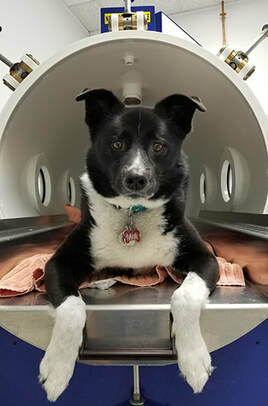 Used for decades in human medical care, hyperbaric oxygen therapy is a comparatively new approach in veterinary settings. It is available at about 50 of the most advanced veterinary practices in the United States. The therapy can speed healing and avoid more invasive procedures in animals with a vast range of health issues. The community-owned, not-for-profit veterinary facility located in Richmond, is celebrating its first birthday February 12 with the opening of Canada’s only Veterinary Hyperbaric Medicine centre. The RAPS Animal Hospital, which opened on Family Day, February 12, 2018, and is wholly owned by the Regional Animal Protection Society, is proud to be the only veterinary hyperbaric oxygen therapy provider in Canada. “Used in conjunction with other preventative and treatment regimes, hyperbaric oxygen therapy can deliver anti-inflammatory, anti-microbial and tissue-healing benefits, accelerating healing dramatically, especially in conditions involving an oxygen deficit,” says Dr. Roey Kestelman, a veterinarian at the RAPS Animal Hospital. 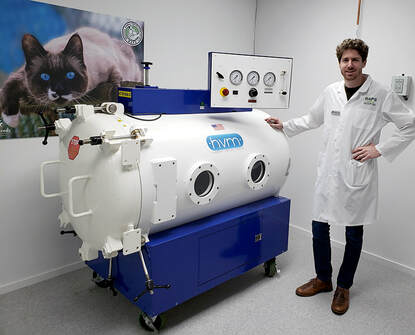 “As part of a comprehensive and holistic approach to animal wellness, hyperbaric oxygen therapy addresses a vast range of medical conditions and may reduce or eliminate the need for surgery or other invasive treatments in some cases,” says Dr. Guy Arad, another of the RAPS Animal Hospital doctors. Hyperbaric oxygen therapy involves placing the patient in a pressurized environment of pure oxygen. The higher ambient air pressure allows the body to absorb considerably more oxygen than under normal conditions. The ability for oxygen to travel or be transferred from the blood to the tissue in need is enhanced by hyperbaric oxygen therapy. “We set out to be a full-service, state-of-the-art animal hospital,” says Eyal Lichtmann, CEO of the Regional Animal Protection Society. “In barely a year, we have positioned ourselves among the most innovative, advanced practices in North America.” Find out more and register your pet for this therapy online! A day of procedures clears backlog at Shelter
Veterinarians from the RAPS Animal Hospital and from other vet facilities volunteered their time to spay and neuter animals at the RAPS City of Richmond Animal Shelter, clearing a backlog of animals waiting for the procedure. It just happened to be Halloween – that was a coincidence – but the impacts of leaving pets unsprayed or unneutered is truly spooky. Spaying and neutering animals is critical to preventing animal overpopulation, homelessness and euthanasia. The speed at which animals can reproduce is incredible. Consider this: A female cat can produce an average of three litters in a year, and the average number of kittens in a feline litter is five. So in just two years, one female cat and her offspring could produce 225 cats. With an average of one litter of five puppies per year, in just two years, a female dog and her offspring could produce 25 dogs. And the numbers skyrocket from there exponentially. Of course, no animal is ever fostered or adopted from our Shelter until they have undergone the procedure (or are scheduled for one, in the case of young animals). The RAPS Animal Hospital is a full-service, not-for-profit veterinary facility. Our motivation is not profit, but providing the greatest amount of quality care to the most animals. |
AuthorWrite something about yourself. No need to be fancy, just an overview. Archives
January 2024
Categories |
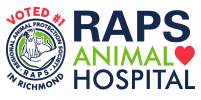
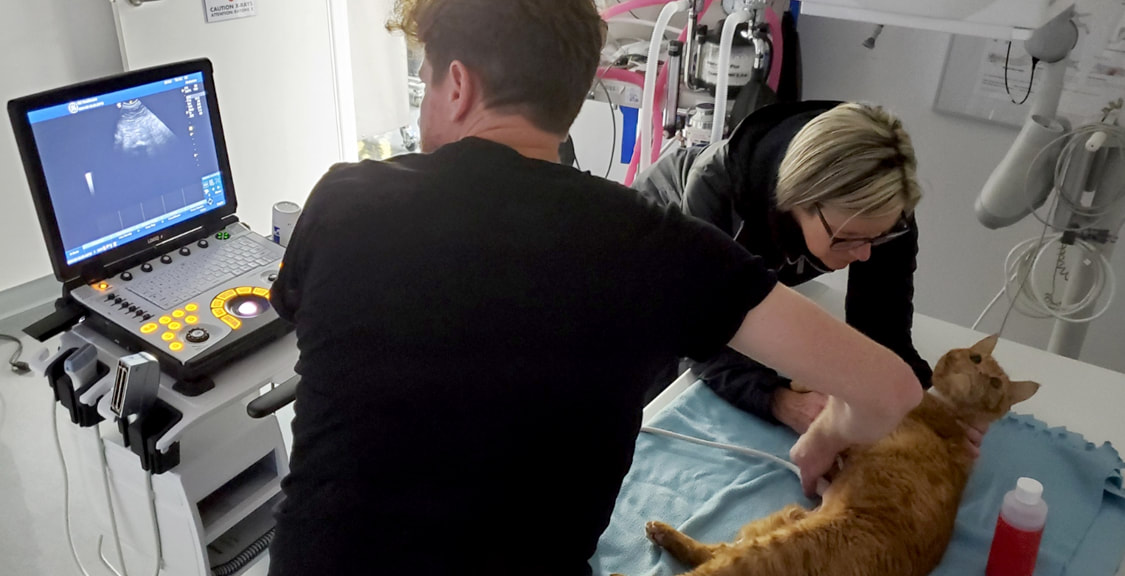
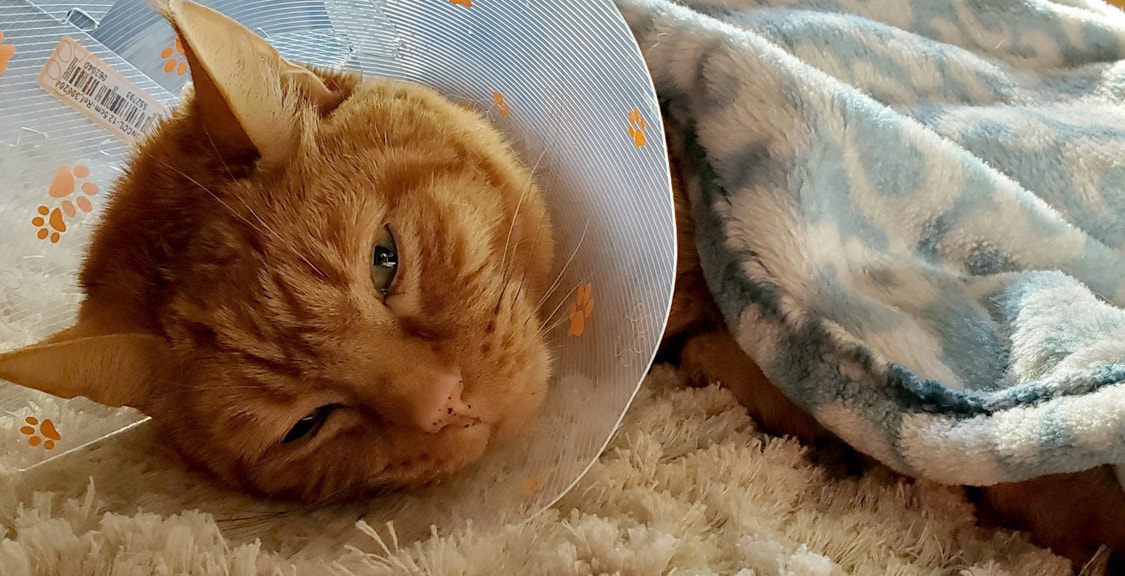
 RSS Feed
RSS Feed

